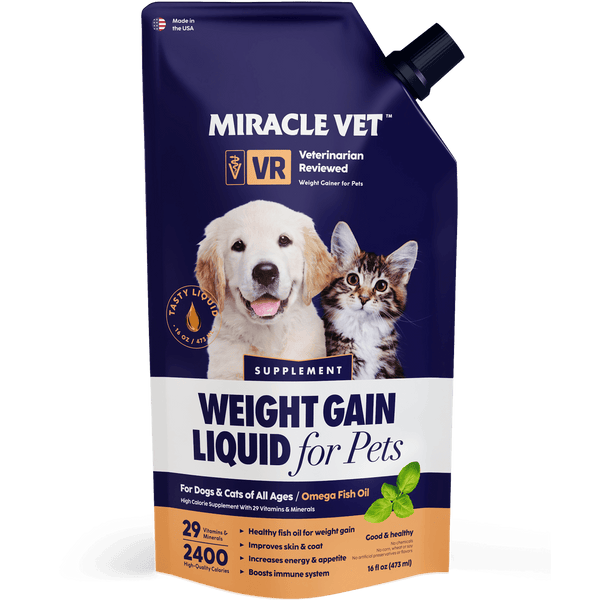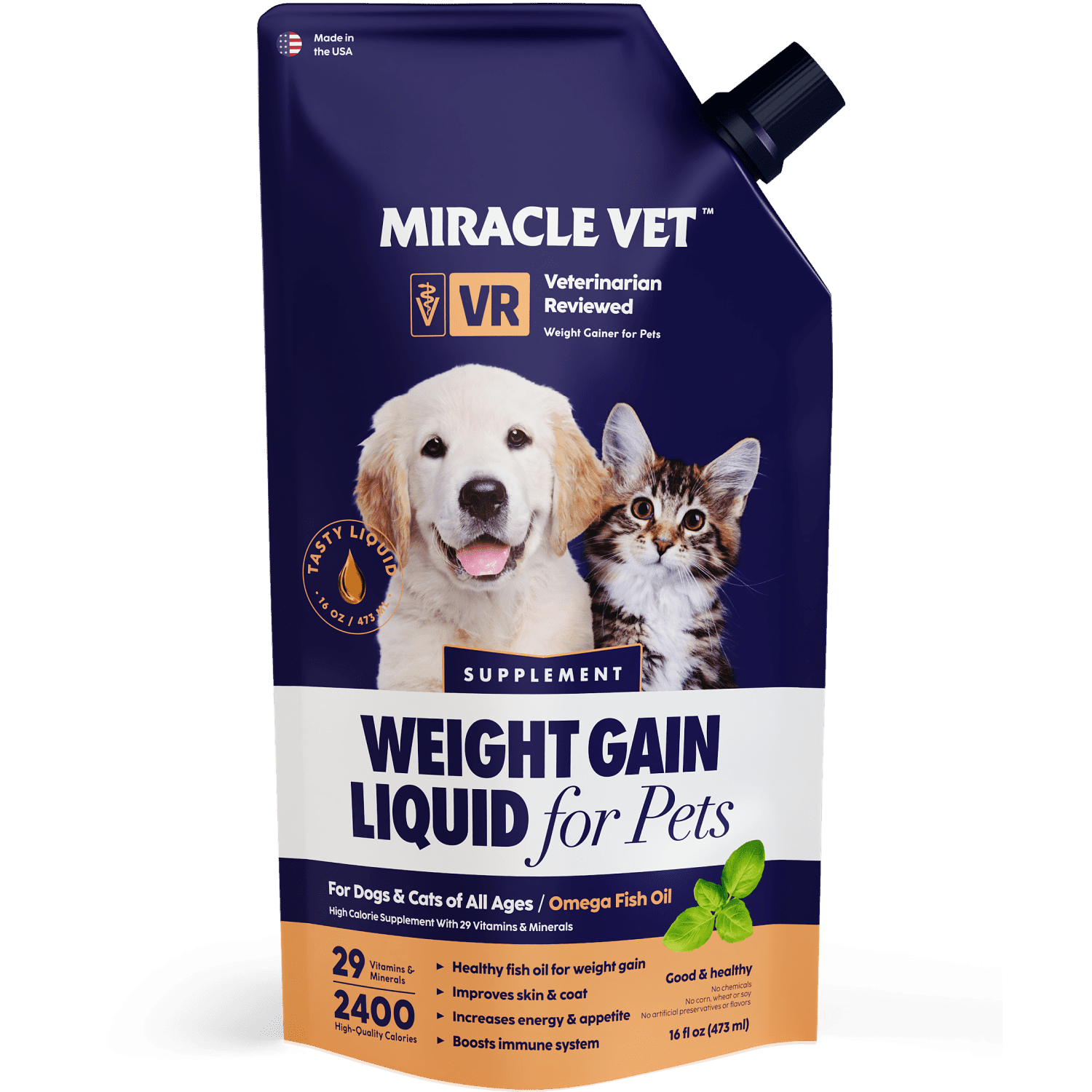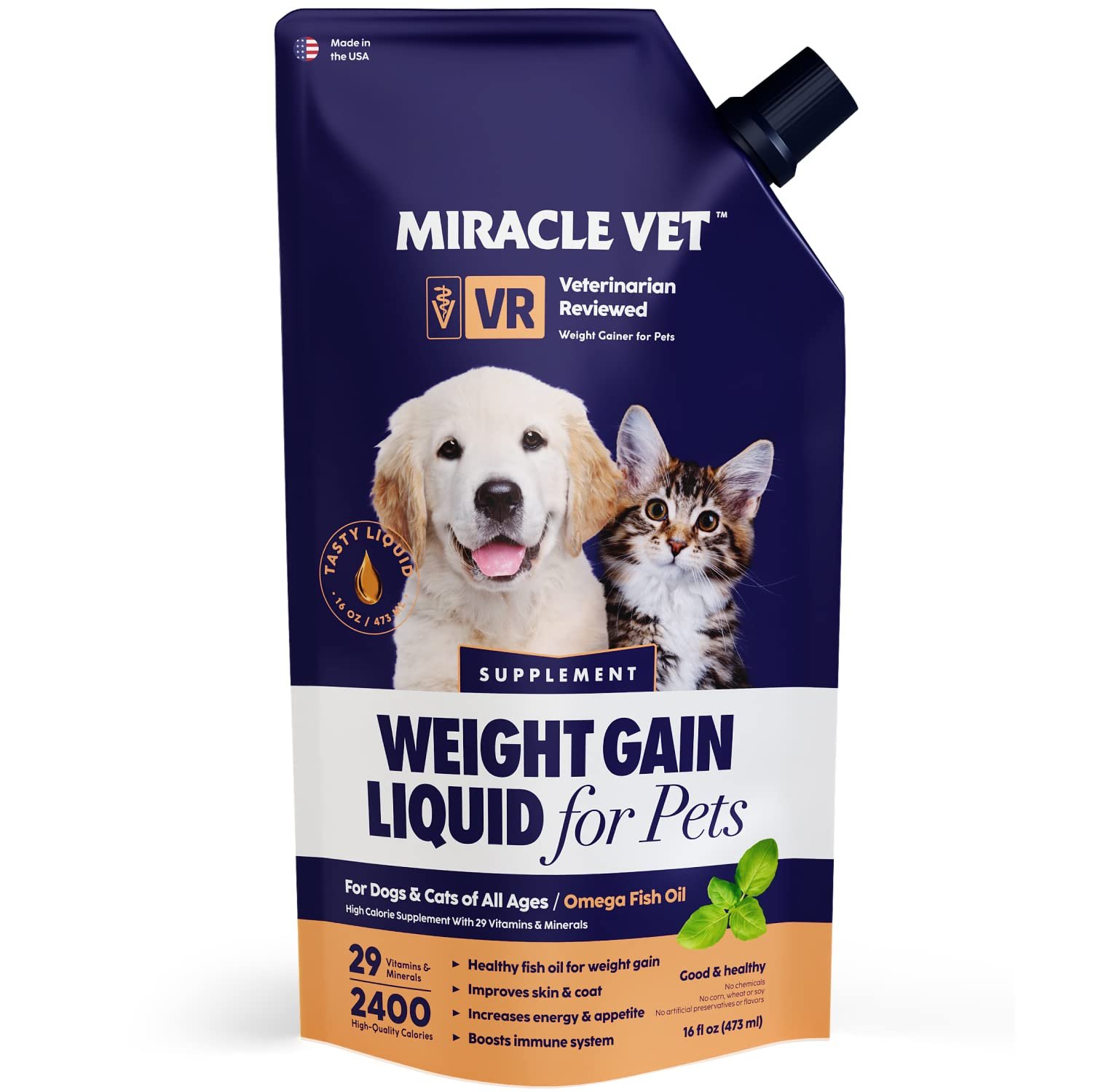How importent are calories for weight gain cats?
To help a cat gain weight, it typically needs an additional 20-30% calories above its maintenance level. For most cats, this translates to around 200-300 extra calories daily, depending on their size and metabolism.
Cats, like all pets, require a specific calorie intake to maintain their health. Weight gain in cats can be essential for those that are underweight due to illness, poor nutrition, or other factors. Understanding how many calories your cat needs is crucial for promoting healthy weight gain.
Factors such as age, activity level, and overall health significantly influence a cat’s caloric needs. Providing the right food, such as high-calorie diets or snacks, can aid in this process. Consulting a veterinarian is recommended to tailor a diet plan that best suits your cat’s individual needs.
Table of Contents

Credit: miraclevet.com
The Basics Of Feline Weight Gain
Understanding how to help your cat gain weight is crucial. Many cats struggle with being underweight. They may need extra calories for various reasons. A balanced approach ensures your cat stays healthy while gaining weight.
Caloric Needs For Underweight Cats
Determining the right caloric intake is essential for underweight cats. Here are some general guidelines:
| Cat Weight (lbs) | Calories Needed per Day |
|---|---|
| 5 lbs | 200 calories |
| 10 lbs | 300 calories |
| 15 lbs | 400 calories |
| 20 lbs | 500 calories |
These numbers provide a basic framework. Adjust based on your cat’s activity level and health status.
Factors Influencing Weight Gain
Several factors can impact your cat’s ability to gain weight. Consider these:
- Age: Kittens require more calories than adult cats.
- Activity Level: Active cats burn more calories.
- Health Conditions: Illness can affect appetite and metabolism.
- Diet Quality: High-quality food promotes weight gain better.
- Stress: A stressed cat may eat less.
Monitoring these factors helps customize your cat’s diet for weight gain.
Assessing Your Cat’s Current Condition
Understanding your cat’s health is vital for successful weight gain. Identifying if your cat is underweight helps in planning an effective diet. Regular assessments ensure your furry friend receives the right nutrition.
Identifying Underweight Cats
Not all cats are the same size. Some may look thinner than others. Here are signs your cat might be underweight:
- Visible ribs and spine
- Prominent hip bones
- Sunken appearance around the eyes
- Low energy levels
- Increased appetite with little weight gain
Body Condition Scoring
Body Condition Score (BCS) helps evaluate your cat’s weight. Vets often use a scale from 1 to 9:
| Score | Description |
|---|---|
| 1 | Severely underweight, b |
High-calorie Foods For Cats
Feeding your cat the right high-calorie foods is essential for weight gain. Cats need extra calories to help them regain strength and health. Choosing the right food can make a huge difference in their progress. Look for foods rich in protein and fat. These nutrients are vital for building muscle and energy.
Top Picks For Weight Gain Diets
Here are some top recommendations for high-calorie cat foods:
| Brand | Type | Calories per 100g |
|---|---|---|
| Nature’s Variety Instinct | Grain-Free Chicken Pâté | 150 |
| Nulo Freestyle | Chicken and Cod Recipe | 170 |
| Wellness CORE | Grain-Free Chicken, Turkey, and Liver | 160 |
| Solid Gold Indigo Moon | High-Protein Cat Food | 180 |
Each of these foods provides ample calories to help your cat gain weight. Check labels for specific calorie content.
Understanding Protein And Fat Content
Protein and fat are crucial for weight gain in cats. They provide the energy needed for daily activities. Here’s a closer look:
- Protein: Helps build and repair tissues.
- Fat: Provides concentrated energy and supports overall health.
Choose foods with at least 30% protein and 15% fat. This balance promotes healthy weight gain. Always consult your vet before changing your cat’s diet.
Feeding Strategies For Weight Gain
Helping your cat gain weight requires smart feeding strategies. Focus on calorie-dense foods. Regular meals and tasty snacks can encourage eating. Monitor your cat’s progress closely. Here are effective strategies to help your cat gain weight.
Meal Planning For Optimal Weight
Meal planning is essential for weight gain. Choose high-calorie, nutritious food. Look for options with high protein and fat content.
| Food Type | Calories per Cup | Protein Content | Fat Content |
|---|---|---|---|
| Dry Cat Food | 300-600 | 30-40% | 15-25% |
| Canned Cat Food | 200-300 | 30-40% | 15-20% |
| Raw Food Diet | 250-400 | 40-50% | 20-30% |
Offer small, frequent meals. This helps increase calorie intake without overwhelming your cat. Measure portions to avoid overfeeding.
The Role Of Snacks And Supplements
Snacks play a crucial role in weight gain. Select high-calorie treats. Look for options with protein and healthy fats.
- Freeze-dried meat treats
- High-protein cat treats
- Peanut butter (in moderation)
Consider supplements if needed. Consult your veterinarian for recommendations. They may suggest high-calorie pastes or powders.
Keep snacks separate from main meals. Offer them between meals to encourage extra calorie intake. Monitor your cat’s weight weekly. Adjust food portions as necessary.
Homemade Vs. Commercial Diets
Feeding your cat to gain weight can be a challenge. The choice between homemade and commercial diets is crucial. Each option has unique benefits and drawbacks. Understanding these can help you make the best decision for your furry friend.
Pros And Cons Of Homemade Foods
Homemade cat food can be a great way to control ingredients. Here are the main pros and cons:
| Pros | Cons |
|---|---|
|
|
Homemade food allows you to tailor meals to your cat’s needs. However, it requires careful planning. Failing to provide a balanced diet can lead to health issues.
Selecting The Right Commercial Food
Choosing commercial cat food involves considering several factors. Here’s how to select the best option:
- Check for high protein content. Look for meat as the first ingredient.
- Consider calorie density. High-calorie foods help with weight gain.
- Review nutritional labels. Ensure it meets AAFCO standards.
- Look for added nutrients. Omega fatty acids and taurine are essential.
- Choose reputable brands. Brands with a good reputation ensure quality.
Commercial foods can offer convenience and balanced nutrition. They often have specific formulations for weight gain. Always consult your vet before making changes.
Monitoring Your Cat’s Progress
Monitoring your cat’s progress is vital for healthy weight gain. Regular tracking helps ensure your cat is gaining weight safely. Adjustments can be made to their diet based on their progress. This section covers how to track weight and when to consult a veterinarian.
Tracking Weight And Adjusting Diets
Start by weighing your cat weekly. Use a reliable scale. Note the weight in a journal. This helps track changes over time.
Here’s a simple table to help you log your cat’s weight:
| Date | Weight (lbs) | Diet Adjustments |
|---|---|---|
| Week 1 | 5.0 | Added 50 calories |
| Week 2 | 5.5 | Maintained calorie intake |
| Week 3 | 6.0 | Added 100 calories |
Adjust the diet based on the weight changes. Increase calories if your cat isn’t gaining weight. Decrease calories if they are gaining too quickly.
When To Consult A Veterinarian
Always consult a veterinarian if:
- Your cat is not gaining weight after several weeks.
- Weight loss occurs despite increased calorie intake.
- Your cat shows signs of illness, like lethargy or vomiting.
Veterinarians can provide tailored advice. They may recommend special diets or supplements. Regular check-ups are essential to ensure your cat’s health.
Common Mistakes To Avoid
Feeding your cat to gain weight can be tricky. Many owners make mistakes that hinder progress. Understanding these common errors helps ensure your cat gains weight safely and effectively.
Overfeeding Risks
Overfeeding may seem like a quick fix. However, it can lead to serious health issues. Here are some risks associated with overfeeding:
- Obesity: Extra calories can cause excessive weight gain.
- Digestive Problems: Cats may experience vomiting or diarrhea.
- Diabetes: Overweight cats are at higher risk for diabetes.
- Joint Issues: Excess weight stresses joints, leading to pain.
Monitor your cat’s weight regularly. Use a food scale for accurate portions. Consult your vet for specific calorie needs based on age and activity level.
Misinterpreting Cat Food Labels
Understanding cat food labels is crucial. Many owners misinterpret the information. Here’s how to decode cat food labels correctly:
| Label Term | Meaning |
|---|---|
| Calories | Total energy provided per serving. |
| Protein | Essential for muscle gain and overall health. |
| Fats | High-fat foods provide more calories. |
| High-Calorie | Foods labeled as high-calorie may not be nutritious. |
Always read the nutritional information carefully. Look for high-quality ingredients. Avoid foods with fillers or low nutritional value.

Credit: miraclevet.com
Long-term Health Maintenance
Maintaining a healthy weight for your cat is essential. Proper calorie intake supports their overall health. It prevents future health issues related to obesity or malnutrition. A long-term diet plan helps keep your cat fit and happy.
Transitioning To Maintenance Diets
After achieving the desired weight, transition to a maintenance diet. This diet stabilizes calorie intake. It prevents weight loss or gain.
- Gradually reduce calorie intake over one week.
- Monitor your cat’s weight regularly.
- Adjust food portions based on weight changes.
Choose high-quality cat food that meets their nutritional needs. Look for options that contain:
| Key Nutrient | Importance |
|---|---|
| Protein | Builds and repairs body tissues. |
| Fats | Provides energy and supports skin health. |
| Vitamins | Boosts immune function and overall health. |
Regular Vet Check-ups And Diet Reviews
Schedule regular vet visits to assess your cat’s health. Vets can evaluate weight and body condition. They offer personalized diet reviews.
- Annual health check-ups are ideal.
- Discuss any changes in eating habits.
- Update diet plans based on health findings.
Regular check-ups help spot potential issues early. They ensure your cat’s diet stays aligned with their needs. This proactive approach maintains long-term health.

Credit: www.amazon.com
Frequently Asked Questions
How Many Calories Are Needed For A Cat To Gain Weight?
To help a cat gain weight, increase its daily calorie intake by 20-30%. Most adult cats need about 20 calories per pound of body weight. Consult a veterinarian for personalized recommendations based on your cat’s health and activity level.
How Many Calories Should An Overweight Cat Eat?
An overweight cat should consume about 20 calories per pound of body weight daily. For weight loss, reduce this amount gradually. Always consult a veterinarian for personalized advice tailored to your cat’s specific needs and health status.
What Can I Feed My Cat To Gain Weight?
To help your cat gain weight, feed them high-calorie foods. Options include high-protein wet food, like Wellness CORE or Royal Canin Veterinary Diet. Incorporate treats like freeze-dried meat. Consult your veterinarian for tailored dietary advice and to ensure proper nutrition for weight gain.
How To Fatten Up A Skinny Cat?
To fatten up a skinny cat, offer high-calorie cat food designed for weight gain. Incorporate snacks like freeze-dried meat between meals. Gradually increase food portions to avoid digestive issues. Consult your veterinarian for specific dietary recommendations tailored to your cat’s needs.
Regular feeding schedules can also help.
Conclusion
Finding the right calorie intake for weight gain in cats is crucial for their health. Monitoring their diet ensures they receive the necessary nutrients. Always consult with a veterinarian for personalized advice. With the right approach, you can help your feline friend achieve a healthy weight in no time.



